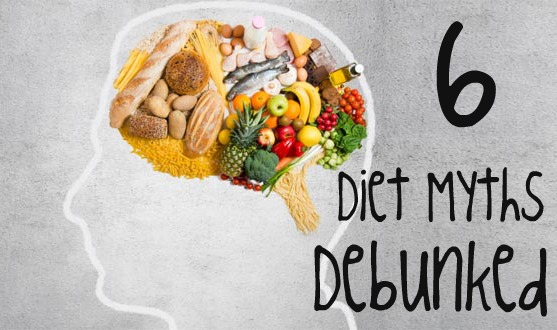Myth # 1 - Don’t eat after 8:00pm.
According to this theory it’s better to eat larger portions of food earlier in the day when you will be more active and thus able to burn it off, rather than in the night when you are likely to be more sedentary and less likely to burn off those calories.
In reality: calories can't tell time.
There is no universal time that everyone should stop eating. People get up at different times, go to sleep at different times, and eat at different times. Many countries eat dinner later than Americans but their populations weigh less than Americans do.
Bottom line: It’s more important for people to be connected to their internal hunger cues than to be eating based on an external influence, like the clock. It's about your overall calorie consumption for that day, not the time.
Myth #2 Carbs make you fat.

This theory is central to countless diet programs, however without carbohydrates our bodies aren’t functioning at their optimal level. The brain alone uses 130 grams of carbohydrates per day. Carbohydrates are also necessary for serotonin production, which is our body's natural mood regulator and appetite suppressant. Serotonin makes you feel emotionally stable, less anxious, more tranquil and even more focused and energetic.
Complex carbohydrates are also the main source of energy for exercise. Whole grains, beans, fruit, and vegetables all contain carbohydrates and are excellent sources of fiber.
The amount you need is dependant on how active you are, so if you are not doing a lot of exercise it’s best to stick to a lower amount of carbs. If you are doing intense exercise regularly then you should be consuming a higher amount of carbs.
Simple carbohydrates like candies, refined bread, sugary cereals, and soda drinks are the types of carbohydrates worth cutting down on as they are a smaller molecule of sugar and if not burned off quickly, will store into fat.
Bottom line: Incorporate more complex carbs into your diet and cut down on the simple carbs. To learn more about good carbohydrates versus bad carbohydrates click here.
Myth #3 Paleo is the ideal diet.
The Paleo Diet is based on eating food that can be hunted, fished, or gathered, such as meat, fish, shellfish, poultry, eggs, veggies, roots, and fruit. It does not include grains, dairy, beans, salt, and sugar. Whole grains, dairy, and beans are nutrient-rich foods. By eliminating them, you could be setting yourself up for a deficiency of certain necessary vitamins or reduce your body’s ability to prevent disease.
Although the Paleo Diet does succeed in cutting down on processed foods that have been highly modified from their raw state through various methods of preservation. It doesn’t take into account the human evolution we’ve gone through since our paleo days. Within a span of 7,000 years our bodies have evolved in response to our environment. For instance, most people adapted to eating dairy by developing lactose tolerance. Additionally just about every single species commonly consumed today, whether a fruit, vegetable or animal, is drastically different from its Paleolithic predecessor.
Bottom line: Follow the Paleo diet in the lightest sense. Cut down on processed foods but continue to consume grains, lean proteins, dairy, and beans as they are important for an overall healthy diet.
Myth #4: Juicing and cleansing will make you loose weight.
Like most fad diets, a juice fast is not an effective way to lose weight and keep it off.
Will you lose weight? Probably, but then again you’re cutting out all of the fat from your diet and drastically lowering your caloric intake. You will most likely put it right back on after the fast.
In fact it could actually have the opposite effect. If you do this to your body enough, you could permanently lower your metabolism. Since your body is in constant starvation mode your body will slow the rate of consumption by lowering your metabolism. Therefore, doing this enough could lower your metabolism permanently.
Most of these cleanses win over people by claiming it helps to cleanse the body of toxins. However, the liver and kidneys are the body’s natural detoxification system and they do a fantastic job of removing waste products and toxins without the help of a juice cleanse.
bottom line: For short term weight loss, juicing and cleansing will do the job. For long term weight loss, it won't. It's simply not sustainable. However, having a smoothie filled with fruits and veggies is a great and easy way to incorporate important vitamins and nutrients into your diet.
Myth #5: Eating fat makes you fat.
Fat, protein and carbohydrates are all essential to your health. There is no universal percentage of each that is right for everyone. Eating past the point of being full on a regular basis, eating when you’re not hungry, emotional eating, skipping meals and overeating later in the day are the type of eating behavior patterns that will lead to weight gain. The body has an innate ability to regulate and maintain a healthy, genetically determined weight if we listen to it.
The brain is nearly 60% fat and we need fat in order to absorb fat-soluble vitamins. According to current research, the healthiest dietary pattern is that of the Mediterranean culture, which emphasizes eating fruits, vegetables, beans, whole grains, nuts, and olive oil. Approximately 35 to 40% of the calories in that diet come from fat.
Healthy weight aside, the Mediterranean diet also reflects a population that eats a significantly higher percentage of fat, and yet has a much lower incidence of heart disease and similar illness than the rest of the world.
Bottom line: Don’t cut out fat. Some of the most healthiest vitamins and nutrients are in fatty foods like avocados, nuts, seeds (pumpkin, sesame, chia, hemp), fatty fish (including sardines, mackerel, herring, and wild salmon that are rich in omega-3 fats), extra virgin olive oil or extra virgin coconut butter.
Myth #6 Gluten is bad for you.

Poor old gluten. This has to be the most popular diet fad out there, people have been led to incorrectly believe that when you cut out gluten all your weight problems will magically disappear. Slap on a "gluten free" sign on pack of brownies and it will be sold out in minutes. It works because we have been lead to believe that gluten free equates fat free and healthy.
A gluten-free diet is a necessity for people diagnosed with celiac disease. Although gluten-free diets are one of the most popular food trends, there is no benefit to going gluten-free if it is not medically warranted. In fact most people that decide to become gluten free are doing so at the the expense of their health. Whole grains, which contain gluten, are a good source of fiber, vitamins and minerals. Gluten-free products are often made with refined grains, and are low in nutrients. If you embrace such a diet, you may end up eating a lot of foods that are stripped of nutrients. Studies have shown that gluten-free diets can be deficient in fiber, iron, folate, niacin, thiamine, calcium, vitamin B12, phosphorus and zinc. Of course you can eat a healthy diet without gluten, but you have to be very knowledgeable, and most people aren’t.
If much of your diet comes from baked goods and large portions of wheat-based foods (like pasta or bread), then you will probably lose weight if you cut out gluten. But following a gluten-free diet doesn't necessarily guarantee a slimmer waistline. Many gluten-free products are loaded with more sugar and fat than their gluten-filled counterparts. Don’t be fooled, a gluten-free cupcake is not healthier than a cupcake with gluten.
bottom line: Gluten isn’t the enemy unless you have been diagnosed with celiac disease. If you don't have celiac disease, a wheat allergy or a gluten sensitivity, you're unlikely to benefit from a gluten-free diet. However, if you decide you want to go gluten free anyway, then do it the right way. Replace wheat with a healthy, naturally gluten-free grain, such as quinoa or buckwheat. Balance the diet with lots of fruits and vegetables, eat more lean meat and dairy products such as yogurt.

















